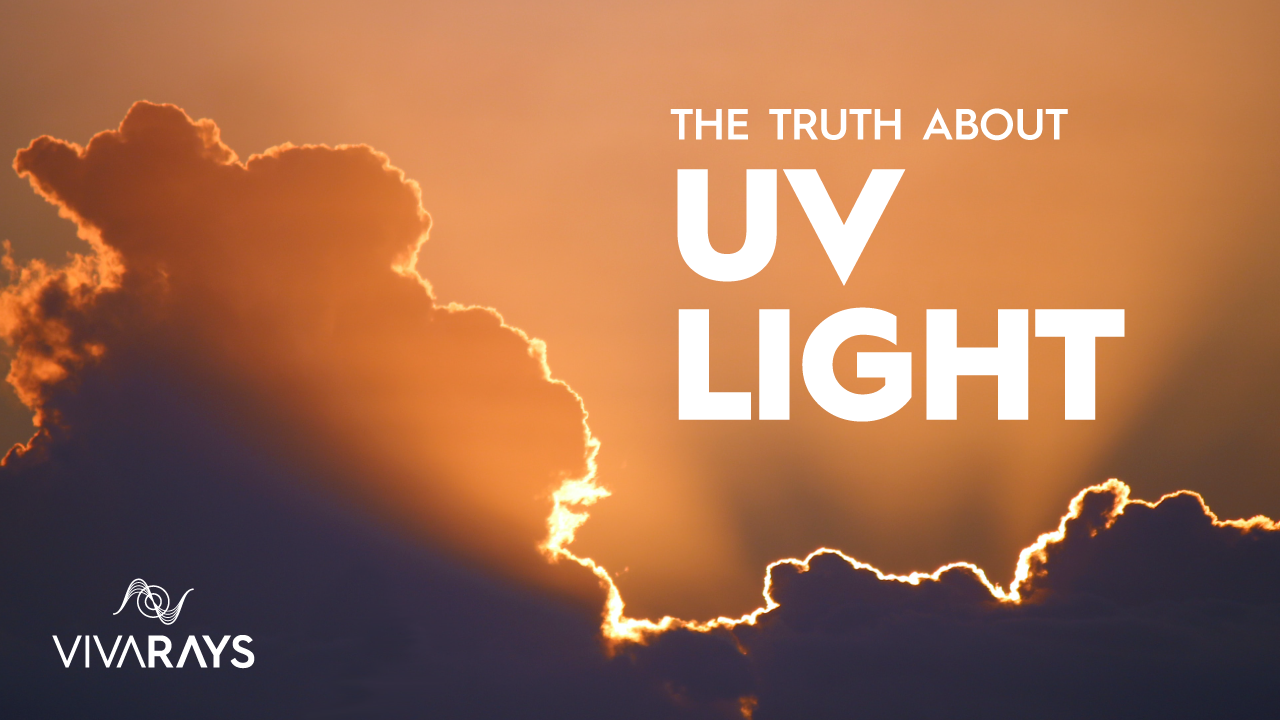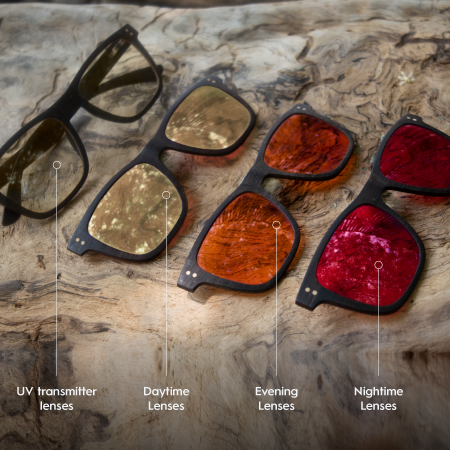The Truth about UV light

Like a lot of concepts related to health, UV light is misunderstood. As with everything in life, context is important when we talk about the impact of UV light on our health.
As far as we can remember, humans have worshiped the sun for its therapeutic properties.
Whether in cave paintings or Egyptian and Aztec deities, humans have consistently recognized the power of light in their life.
Full spectrum sunlight consists of a mixture of different wavelengths. From the shortest to the longest wavelengths, we have ultraviolet light (UV), visible light containing all the rainbow colors, and infrared light.
UV and infrared light are invisible to our eyes, but it doesn't mean they don't affect us—quite the opposite.
What determines if UV light is present in our environment?
The amount of UV light available to us depends on several factors, including:
- The time of day: UV levels are at their highest mid-day. They are at their lowest during early morning and late afternoon/early evening.
- Latitude: the sun's radiation is most intense at the equator and the lowest at the poles. The farther you are from the equator, the less UV light you are exposed to. Depending on the season, you might not get UVB at all.
- Altitude: UV radiation decreases with the distance it has to travel. So the higher you are in altitude, the closer you are to the sun and the more UV light you are exposed to.
- Weather conditions: The more cloudy it is, the less UV radiation gets through.
Is sunlight good for me?
How did we move from a place of worshiping the sun to being frightened by it?
Part of it is from the billions of dollars made by different industries related to skin health.
But a big part of it is due to something that often happens in research:
Looking at the world through a straw
We look at one variable out of context instead of looking at the whole picture.
An excellent example of this phenomenon is when coffee had been associated with lung cancer, only to find out later that it was the cigarettes people were smoking while drinking coffee that caused lung cancer.
Does UV light cause blindness and cataracts?
One primary study that created a lot of fear about UV light was done on monkeys at Virginia College in 1981.
Researchers opened the eyelids of the monkeys with clamps and made it impossible for them to blink, a natural mechanism used to adjust our eyes to the intensity of brightness.

Besides the physical abuse, they also shone a very high amount of bright light into their eyes, containing a much higher percentage of UV light than what we usually get from natural exposure to sunlight.
High amounts of UV can be harmful, but trace amounts of it, similar to how it is present in sunlight, have tremendous benefits for our health, vitality, and energy levels.
This returns to the dysfunctional pattern of looking at the world through a straw. Again, context is everything.
Does UV light cause cancer?
In mainstream media, UV light is demonized and linked to skin cancer, but the worst form of the disease, melanoma, is seen more often in people who do not receive regular sun exposure.
It also tends to occur on body parts that do not receive sun exposure (like the groin or the axilla).

Sunscreen use has been increasing, while for 95% of the population, time spent outside in the sun has been decreasing tremendously since the 1950s.
So if the sun is to blame, how come skin cancer has been skyrocketing since we moved into an indoor lifestyle, living under artificial lights?
If sunscreens and sunglasses are the solution, how come skin cancer rates are rising while more and more people are burying the sun from their lives, putting on sunglasses, and buying the sunscreen solution?
Most cancer and autoimmune diseases rate increases the farther you move from the equator (thus, the less UV exposure you have year-round).
This can be attributed to the positive impact sun exposure has on our immune system, in which UV light plays a significant role.
According to research, insufficient sun exposure may be responsible for 820 000 deaths in the US and Europe each year.
Thousands of peer-reviewed studies demonstrate the tremendous benefits of UV light. For some reason, the conventional medical system hasn't caught up to this research and bases its interventions on old studies that have been disproven.
UV light has even been categorized as a potential carcinogen. This truly encapsulates the misunderstanding of how UV light within full-spectrum sunlight actually works.
Saying that UV is creating cancer and thus should be avoided is the same as saying that water causes drowning, so we should avoid water at all costs.

The full spectrum of natural sunlight is a delicate balance between UV, visible, and infrared light.
All those different frequencies have benefits for our health.
Problems arise when we isolate one of these frequencies (ex: UV light in a tanning salon) or when we get the wrong frequencies at the wrong time of the day (ex: blue light at night).
What are the health benefits of UV light?
Here is a quick review of the multiple benefits UV light has on our health:
UV light and Cardiovascular Health & Stress
- It lowers blood pressure by increasing our endogenous production of nitric oxide (NO), a natural vasodilator. (this also has a positive impact on our sexual health)
- It increases the cardiac output by 35% (the heart becomes more robust and drives blood more easily into the body).
- UV light decreases the resting heart rate, calming your nervous system.
- Patients with severe asthma can breathe freely after treatment with UV light.
UV light and Hormones

- UV light makes you lose weight. It stimulates the thyroid gland and increases metabolism and fat burning. Swiss sun therapists found that their clients started developing more muscles and less fat even though they had not exercised for months.
- UV light increases sex hormones (on average, 120% after exposure to UVA and UVB).
UV light: Mood & Energy
- UV light makes your mitochondria more efficient, allowing them to produce more energy.
- It helps to transform amino acids like tryptophan into serotonin, our feel-good neurotransmitter, and tyrosine into dopamine, our motivation, and reward neurotransmitter.
UV light: Immune system & Longevity

- UV helps control apoptosis, the normal process in your body responsible for getting rid of cancer and old/decaying cells.
- Did you know that the more sun exposure you have (which includes UV light), the lower your chances of all-cause mortality? And that even includes skin cancer!
- Most of us know that smoking isn't good for our health. According to research, a lack of sunlight (thus a lack of UV light) is as bad as smoking for your health!
- UV light is very effective in killing infectious pathogens. During the Spanish Flu of 1918, patients exposed to fresh air in the sun had a higher chance of survival and recovered faster.
UV light and Skin Health
UV light is a very effective treatment for skin disease. Reports from the national psoriasis foundation show that 80% of skin disease patients improve when exposed to UV light.
Melanocyte-stimulating hormones (MSH) describe a group of hormones produced by the pituitary gland, hypothalamus, and skin cells.

It is important for protecting the skin from UV rays since it stimulates the production of melanin, the pigment that allows you to tan and protects your skin against excess UV exposure (keep in mind that too much of a good thing can become a bad thing).
MSH is activated by UV light. Interestingly, it is not activated when UV light strikes the skin. It is activated through the eyes!
This is important because your ability to produce melanin becomes impaired when you wear sunglasses (or regular prescription glasses) since they block UV light.
Your sunglasses makes you more susceptible to sunburn.
Vitamin D & Cholesterol
UV light creates vitamin D. Vitamin D is a hormone that affects every one of your cells.
It is vital for a healthy immune system, skin, strong bones, and optimal mental health! UV light plays a fundamental role in breaking down cholesterol and helping the body to maintain a healthy cholesterol level.

When cholesterol is broken down by UV light, it allows us to make all the molecules derived from cholesterol, such as sex hormones and Vitamin D3. Yes, the sun is the best source of vitamin D.
This is how we are meant to produce vitamin D, which acts as a hormone and is related to thousands of bodily functions. Simply put, Vitamin D is crucial to optimal health.
The vitamin D supplements you buy from the store are very different from the vitamin D we make from sunlight. We make vitamin D when UVB from sunlight hits our skin.
This instantly breaks down the cholesterol under the skin, producing vitamin D1. The D1 absorbs infrared light from sunlight and turns into cholecalciferol which then gets transferred to the liver and turns into vitamin D2 and then to the kidney to become vitamin D3 in its most bioavailable form, absorbed in the bloodstream and transferred to other parts of the body.
So vitamin D supplements are far from optimal choices to achieve excellent health and cannot replace sunlight and UV light.
One of the simplest and most efficient ways to get access to the power of UV light is to make sure that your eyes are exposed to this powerful nutrient.
If you don't wear prescription glasses, go outside during the day without sunglasses. But if you wear prescription glasses, you need to check out our new UV transmitter lenses.
Bocking all UV light during the day with prescription glasses or sunglasses messes with your circadian rhythm and can cause fatigue, depression, insomnia, and loss of productivity.
While your regular prescription glasses are designed to filter out 100% of UVA and UVB, our lenses allow visible light and UV light through so that you can get what nature intended for us.
They are designed to replace your regular prescription lenses to restore a more natural spectrum of light when you are outside and exposed to UV light.
For billions of years, we have evolved under full-spectrum sunlight that is rich in different frequencies of light that work together to create a complete, whole, and full-spectrum light emission, that is, the source and the fuel of all life on earth.
UV light provided by nature is a powerful ally to our health. Like superman, you need the sun's full spectrum to access your full potential!





Ohh, sadly, not that we are aware of. Most of them are with tints like cars. The alternative is to just have them clear, no tints at all, to allow the sunlight to pass through. The best is to leave the windows open + you’ll get that fresh air 💛🧡❤️
Are there windows made with the same technology you use that allows UVB and UVA to pass through?
Leave a comment